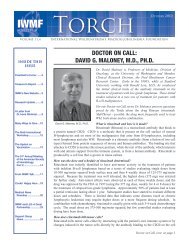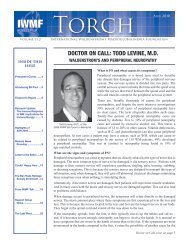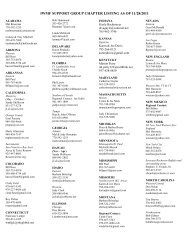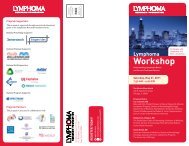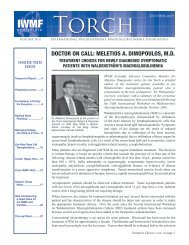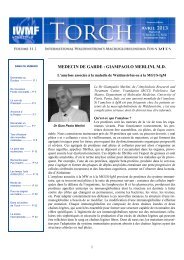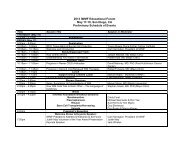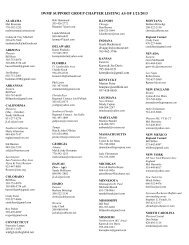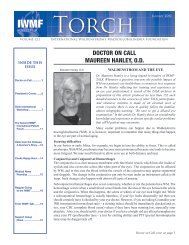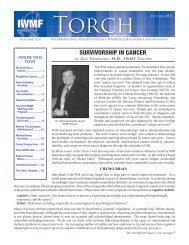Fall 2007 - International Waldenstrom's Macroglobulinemia ...
Fall 2007 - International Waldenstrom's Macroglobulinemia ...
Fall 2007 - International Waldenstrom's Macroglobulinemia ...
Create successful ePaper yourself
Turn your PDF publications into a flip-book with our unique Google optimized e-Paper software.
PAGE 14<br />
From IWMF-Talk, cont from page 11<br />
Betty McPhee writes regarding the phenomenon of<br />
Rituxan flare to remind us that not everyone experiences<br />
it. Guy Sherwood says that many oncologists recommend<br />
plasmapheresis before Rituxan therapy when IgM reaches a<br />
certain level, though this level varies by doctor. Matt raised<br />
the issue of one downside to a great treatment result: after a<br />
course of fludarabine and Rituxan no less than eight years<br />
ago that brought his hemoglobin and IgM all the way back<br />
to normal levels, Matt’s IgG worsened with every blood<br />
work report. Could the combo treatment have caused that<br />
negative despite the positive results with other important<br />
blood readings? Should Matt seek the fludarabine/Rituxan<br />
combo treatment again if it becomes time to treat?<br />
Jeff Atlin writes about Velcade and Rituxan in combo,<br />
referencing a Phase-II trial in which the amount of Velcade was<br />
halved. The result: excellent response—and fortunately without<br />
the PN previously associated with higher dose Velcade.<br />
Another thread of Talk that sparked interest concerned a<br />
rapid-infusion test of Rituxan. The standard infusion rate<br />
for Rituxan, established empirically taking potential adverse<br />
reactions into account, is slow, ranging between 4-7 hours.<br />
But, as recently reported, 1200 patients in British Columbia<br />
tolerated Rituxan delivered by a severely compressed<br />
infusion schedule in which 20% of the total drug was infused<br />
in the first 30 minutes and the remaining 80% in the next<br />
60 minutes. What a potential improvement in resource<br />
utilization! Betty McPhee said that she had recently had a<br />
rapid infusion of Rituxan without problem.<br />
Finally, there continues to be considerable passionate<br />
discussion on IWMF Talk about the many unknowns<br />
concerning maintenance Rituxan. Bob Bent, Ron Draftz,<br />
Dave Johnston, Dr. Tom Hoffmann, and this writer, among<br />
many others, weighed in with a wide array of thoughts and<br />
speculations. Though the evidence does not now exist to<br />
show that maintenance-R is or is not a treatment approach<br />
superior to Rituxan-As-Needed, this topic continues to<br />
excite the imaginations of the readers of Talk as much as,<br />
if not more than, any other topic that pops up. There have<br />
been many reports from patients who say they were, or are,<br />
on maintenance-R schedules, with spirited responses from<br />
others. Perhaps Guy Sherwood has the last word-–for now,<br />
anyway!–with a reminder from the scientists working so<br />
hard for us. A panel of experts at the recent 4th <strong>International</strong><br />
Workshop on WM on Kos Island, Greece, addressed the issue<br />
of maintenance Rituxan, and there was a virtually unanimous<br />
decision that the recommendation in favor of maintenance<br />
(every 3 months for 2 years or similar protocol) could not<br />
be made at this time because of lack of data. By the time<br />
the next <strong>International</strong> Workshop on WM is held in two years,<br />
Guy expects that sufficient data will be available to make a<br />
confident, fact-based recommendation, be it for or against<br />
maintenance Rituxan. In the meantime, we can expect this<br />
topic to continue to surface again and again.<br />
SUPPORT GROUP NEWS<br />
edited by Penni Wisner<br />
New support groups continue to blossom and expand.<br />
Here in California, in the south, a new group formed, and<br />
the Orange County group is very active. One of the most<br />
exciting developments for groups has been the visits of<br />
Drs. Irene Ghobrial and Steven Treon, both of Dana-Farber<br />
Cancer Institute. Their cutting edge research and clinical<br />
expertise is very much on display in their presentations at<br />
these small (compared to the annual IWMF Educational<br />
Forum), meetings. And summer appears to be a social<br />
season for support groups as many host annual barbecues<br />
and picnics. A recent post to IWMF-Talk concerned research<br />
into what patients wanted from support groups. Run by and<br />
for WM patients and their families and friends, they reflect<br />
our unique concerns. Read on to discover what the groups<br />
in your area are discussing.<br />
CALIFORNIA<br />
Los Angeles<br />
Katie Coen organized the Los Angeles support group which<br />
met for the first time in July. They had a good turnout and<br />
plan to continue to meet regularly. Occasionally, the group<br />
will join with its neighbor in Orange County for programs<br />
such as the October 6 presentation of Dr. Irene Ghobrial.<br />
Orange County<br />
Marty Glassman, co-leader of the Southern CA support<br />
group, organized the October 6 meeting featuring Dr. Irene<br />
Ghobrial at the Hoag Cancer Center in Newport Beach.<br />
Sacramento and Bay Area<br />
Does it count as a meeting when two members meet? Talk<br />
on the telephone? Perhaps the most important—and most<br />
enjoyable—role of support group facilitators is that of “first<br />
responder.” Newly diagnosed patients find the name of the<br />
local group leader on the web and call or email. Hopefully,<br />
after that initial call, patients can more easily navigate the<br />
often confusing path before them. At first some patients are<br />
reluctant to attend a meeting: they are afraid a room full of<br />
WMers will be a room full of sick people. Or they just do not<br />
want to think about their disease. But then, gathering their<br />
courage, they show up. And discover homemade cookies and<br />
a caring group of active, intelligent, curious, dedicated peers.<br />
And from these, they can learn what lies ahead after diagnosis,<br />
the subject of the group’s fall meeting October 14.<br />
COLORADO & WYOMING<br />
The Colorado-Wyoming support group (also known as<br />
the Rocky Mountain support group) enjoyed a wonderful<br />
presentation in September by Dr. Irene Ghobrial. She spoke<br />
to a joint meeting of the IWMF group and the local chapter<br />
of the Leukemia & Lymphoma Society. The winter meeting<br />
will feature Dr. Steven Treon on February 9.<br />
Support Group News, cont on page 15



